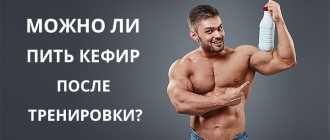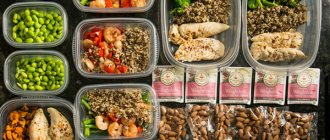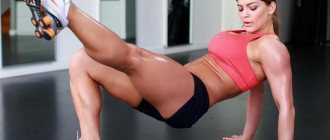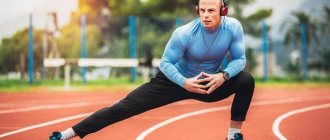Author: SUSAN PAUL
After a long run, does your stomach feel like a bottomless barrel? The tips in this article will help you break the habit of eating all day after a long workout.
To cope with the feeling of constant hunger after exercise:
- include more protein and healthy fats in your diet;
- drink enough fluids before and during exercise;
- Prepare healthy, balanced meals ahead of time so you can eat them immediately upon returning from your workout.
It's a fairly common situation: after a long workout, you find yourself in the kitchen, eating everything you can get your hands on - and still hungry. Of course, you may be wondering: how can you cope with that feeling of hunger that haunts you long after finishing a long workout? Luckily, there are ways to help you deal with this nutritional problem. Below you will find some tips:
What are the basic principles of post-workout nutrition?
The most important thing is what and when you eat after training. Your post-workout meal should consist of carbohydrates and protein to replenish energy stores and kickstart the recovery processes in your muscles. For example, foods rich in carbohydrates or protein include: whole grain bread, fruits, vegetables, eggs, lean meat, vegetable protein.
It's also worth consuming some healthy fats, such as those found in avocados or fish; fats will keep you feeling full.
Eat to lose weight
So, we found out: what you eat before training can affect its results. Don't complain that you have less than an hour left before your workout and you just don't have time to eat. Even in this case, you can find a completely acceptable option to “refuel”. So how long do you plan to train?
Less than 60 minutes. Low intensity workout
During the class you can talk without tension (stretching, yoga). • Less than an hour before training. And since it will be light, you don’t have to eat too much in a hurry: your energy resources are unlikely to have time to deplete. "But don't go to the gym dehydrated and hungry, or you'll get tired quickly," says Karen Reznick Dolins, a sports nutritionist at Columbia University. The best choice. Half an apple and water. • More than an hour before training. You will probably have time for a small snack: a combination of low-fat foods with a low glycemic index. The best choice. Yogurt with rye bread and pieces of fruit.
Less than 60 minutes. High intensity workout.
During training you cannot say a word (running, cycling).
• Less than an hour before training. During exercise, the body redirects blood from the stomach to the muscles, and digestion slows down. If you eat shortly before exercise, fermentation of undigested food can cause discomfort and pain. Didn't have time to eat? Have a snack with simple carbohydrates. The best choice is a piece of white bread with low-calorie jelly or a sports drink.
• More than an hour before training. You need low glycemic index foods to optimize fat loss. The best choice is a turkey bowl with brown rice.
Did you find yourself hungry on the way home from the gym? Buy a small bottle of 2.5% fat kefir and warm it in your hands: a warm drink of moderate fat content will satisfy your hunger better than fruit with low-fat cottage cheese!
More than 60 minutes. Low intensity workout
• Less than an hour before training . It won't hurt to refresh yourself, since you are going to study for more than an hour. However, you probably won't enjoy doing inverted yoga poses or doing abdominal crunches on a full stomach. The best choice is a couple of cereal breads and a piece of cheese.
• More than an hour before training. To ensure that your final session doesn’t tire you out, eat a dish that combines grains with proteins and fats. All this is absorbed at different speeds, and you will be full all the time. The best choice is a cup of muesli with milk and a hard-boiled egg.
More than 60 minutes. High intensity workout
• Less than an hour before training. Dangerous situation! And there’s not much time before class, and there’s serious work ahead. The solution is simple carbohydrates, which you will need in larger quantities than for a short workout. Eat a dish with 150–200 kcal. The best choice is a cup of raisin cereal or a few crispbreads with jam.
• More than an hour before training. "Eat a 400-600 calorie meal that's 60% low-GI carbohydrates and 40% protein and fat," says nutritionist Christine CLARKE. The best choices are a whole grain muffin with 1 slice cheese and 2 slices turkey or 1 cup oatmeal with skim milk and 1/3 cup raisins.
How long after a long workout should you eat?
Eat as quickly as possible after finishing a long run, preferably within 20-30 minutes, but no later than 2 hours after training. If you don't feel like eating after a run, try drinking a protein drink. In any case, try to consume calories containing carbohydrates and protein as quickly as possible after exercise - in solid or liquid form.
The body is designed to quickly and efficiently absorb the nutrients it needs after a workout, so try to provide it with what it needs. When you run for a long time, your muscles experience micro-damage, so you need protein as a building block to “repair” your muscle fibers.
Carbohydrates are needed to restore glycogen stores, which are depleted during long running.
You may consume nutritional supplements such as energy gels during long workouts. Gels are rich in sugars, which causes a spike in blood sugar, which we need while running; however, then the sugar level inevitably drops. If your workout is very long, you may want to eat several times during the workout to maintain your sugar and energy levels without letting them drop too much. However, for some time after training, the body remains in an excited state, continuing to require energy, that is, the effect of reducing sugar continues even after the end of a long workout - you need to support it with proper nutrition.
Too many simple carbohydrates
Theoretically, a healthy person cannot suffer if he gets most of his carbohydrates from “simple” sources. But in practice it turns out differently. Someone safely eats 100 g of honey a day and feels normal, but someone starts eating sweets with salty, sour, and “something else”, and then does not lose weight.
To read: 5 signs that you do not need this dietary supplement
There are also real deviations in health, when after each serving a sweet person experiences a loss of strength and a desire to eat again. This is due to a violation of insulin metabolism, and should be a reason to consult a doctor.
In order to maintain normal metabolism on a diet, we are recommended to have no more than 10-20% sweet carbohydrates in the diet. That is, we can eat one serving of sweets, but “exchanging” all the buckwheat for sweets makes no sense.
Can eating during exercise help?
Yes. One way to regulate your blood sugar is to eat smaller meals more often than usual during a long workout. For example, instead of eating 1 energy gel in the middle of a long workout, eat the gel in 2 or 3 portions at equal intervals. This technique will help you avoid large drops and spikes in your sugar levels during a workout, and thus make it easier for your body to level it out after the workout.
WHEN CAN YOU DRINK AND EAT AFTER RUNNING?
Optimal drinking regimen and proper nutrition for a runner. We've already written about how much water a runner should drink during a long run. Today we’ll talk about how to properly restore the balance of fluids and nutrients after finishing a workout or marathon.
Drinking regime
Let's start with the fact that running can be different. Short-distance runners follow a completely different routine than marathon runners. Or another example. A half-hour workout in subtropical conditions is radically different from exactly the same one, only in winter conditions (especially at sub-zero temperatures).
It must be said that the slogan “the more water, the better,” proclaimed by scientists in the 90s of the last century, is now considered outdated. Excess water in the body is just as harmful as its lack. Everyone knows that a marathon runner loses a large amount of fluid during a race, and during a simple workout, not only water comes out through sweat, but also useful electrolytes (for example, sodium).
That is why it is necessary to replenish not only the loss of water, but also electrolytes. For this purpose, long-distance runners use an isotonic solution. Latest medical research Center at Loyola University clearly shows that many runners, especially amateurs and beginners, drink too much water. This sometimes leads to sad consequences. When running marathons, sodium loss through sweat is not so great that it would be necessary to dilute the blood with liters of water, since this leads to cellular edema.
Dr. James Winger, who conducted this study, unequivocally states that “getting ahead of thirst” is a dangerous misconception, and you should drink at the first sign of thirst. They are reliable indicators that it is time to take a few sips of liquid.
Therefore, 15-20 minutes after the end of the race you should drink a little (about 200 ml of liquid for marathon runners) and it is better if it is water with the addition of a small amount of electrolytes and glucose. And further replenishment of the loss of important nutrients is made up by a properly balanced diet.
Proper nutrition after running
The basis of a balanced runner's diet is the consumption of specific amounts of nutrients, as well as vitamins and minerals. Scientists have long proven that the main suppliers of energy in the human body are carbohydrates and fats.
However, some athletes, especially those who want to lose weight, took this information the wrong way and focused on fats, fearing that consuming even a small amount of carbohydrates in food would lead to weight gain. “Fat” diets ended in complete collapse and loss of health!
Therefore, we advise runners to follow proven carbohydrate intake standards: for a low volume of training (about 32 km/week), the body requires 4 g per 1 kg of body weight (per day). At very intense loads – up to 8 g/kg.
Muscle protein is inevitably damaged when running, this is normal. To restore it, 1 to 1.6 grams of protein per 1 kg of body weight per day is required.
Of the fats, I would like to pay special attention to Omega-3. In addition to regular fats, be sure to include sources of this fat in your diet: flaxseed oil or fish oil.
Immediately after training, you need to replenish your carbohydrate supply: after a light jog at the rate of 0.3 g per 1 kg of body weight, after a 32-kilometer race this will be a completely different figure - 1.2 g / 1 kg.
After some time, start replenishing proteins, fats, electrolytes, and vitamins. This is especially true for our dear marathon runners. This is the only way to maintain excellent health after a long run!
-AB-
Is it necessary to eat before a run?
Having a small snack before a long run can also help you avoid overeating after your workout. Blood sugar levels are at their lowest in the morning, so you shouldn't go for a long run in the morning on an empty stomach. Replenish your body's energy levels with a light breakfast, such as toast with peanut butter, an energy bar, or cereal.
.
Meal frequency
Many people, with a relatively optimal “matrix” of proteins, fats and carbohydrates, have a rather uneven distribution of food throughout their active day. Let's say a girl goes to the gym after work. She had lunch at one o'clock in the afternoon, and it was relatively full. Before training, she drinks a thin protein drink in water, or chews a bar “with fiber and protein.” It is not surprising that after training her feeling of hunger reaches cosmic proportions. Of course, the snacks and main meals theory is good if you don't have much physical activity, but not so much if your goal is to train effectively. Try to make the 4 meals after breakfast approximately equal in time intervals, calorie content, and macronutrient composition.
To read: Vitamin overdose: myth or reality
And yes, the worst decision to eat carbs in the evening can save, not “destroy” your waistline. Mixed foods, according to most sources, are the most optimal for anyone who strives for a longer feeling of fullness. Therefore, perhaps the “protein-complex carbohydrates-fats” scheme is more suitable for you, rather than the “protein-fiber” scheme for all meals.











